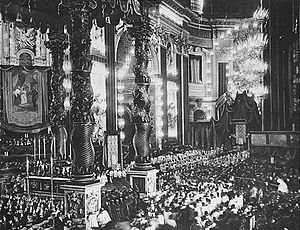On May 16th, 1920, history was made as Joan of Arc, the French heroine renowned for her pivotal role during the Lancastrian phase of the Hundred Years’ War, was officially canonized as a saint by Pope Benedict XV. This significant event marked the culmination of a centuries-long journey to recognize the extraordinary contributions and sacrifices of this iconic figure.
The Life and Times of Joan of Arc
Joan of Arc, also known as Jeanne d’Arc, was born in the early 15th century in Domrémy, a village in northeastern France. She rose to prominence during the Hundred Years’ War, a protracted conflict between England and France, which had far-reaching implications for the political and social landscape of Europe.
Joan’s remarkable journey began in 1429 when, at the age of just 17, she played a pivotal role in turning the tide of the war in favor of the French forces. Driven by her unwavering faith and a deep sense of purpose, she claimed to have received divine visions and heard the voices of saints, including Saint Michael, urging her to take action and assist the dauphin, the heir to the French throne.
Emboldened by her convictions, Joan of Arc fearlessly led French troops into battle, securing several crucial victories and ultimately paving the way for the coronation of Charles VII at Reims Cathedral. Her unwavering resolve and strategic acumen not only bolstered the morale of the French forces but also captured the imagination of people across France and beyond.
The Trial and Martyrdom of Joan of Arc
Despite her undeniable impact on the war and the collective consciousness of the French populace, Joan of Arc’s journey took a tragic turn when she was captured by forces loyal to the English crown. In 1431, she faced a politically charged trial orchestrated by her adversaries, culminating in her conviction on charges of heresy and witchcraft.
Despite vehemently defending her divine mission and steadfastly maintaining her faith, Joan of Arc was ultimately sentenced to death and met a tragic fate at the stake. Her unwavering commitment to her beliefs and her refusal to renounce her visions and experiences left an indelible mark on history, solidifying her status as a symbol of resilience and unwavering conviction.
The Canonization of Joan of Arc
It was not until the 20th century that Joan of Arc’s profound impact and enduring legacy were officially recognized by the Catholic Church. On May 16th, 1920, Pope Benedict XV presided over the canonization ceremony, declaring Joan of Arc a saint and affirming her place in the pantheon of revered figures within the Catholic faith.
This momentous occasion not only honored Joan of Arc’s unwavering commitment to her faith and her pivotal role in shaping the course of history but also served as a testament to the enduring power of her legacy. By bestowing sainthood upon her, the Catholic Church acknowledged her martyrdom and the profound sacrifices she made in service of her convictions and her nation.
Joan of Arc’s canonization stands as a poignant reminder of the enduring impact of individuals who fearlessly chart their own course and stand unwavering in the face of adversity. Her legacy continues to inspire countless individuals across the globe, serving as a timeless testament to the power of faith, courage, and unwavering determination.
In conclusion, the canonization of Joan of Arc on May 16th, 1920, stands as a testament to the enduring legacy of a remarkable woman whose indomitable spirit and unwavering faith reshaped the course of history. Her journey from a humble village in France to the hallowed annals of sainthood serves as an enduring source of inspiration and a powerful reminder of the transformative power of conviction and courage.

